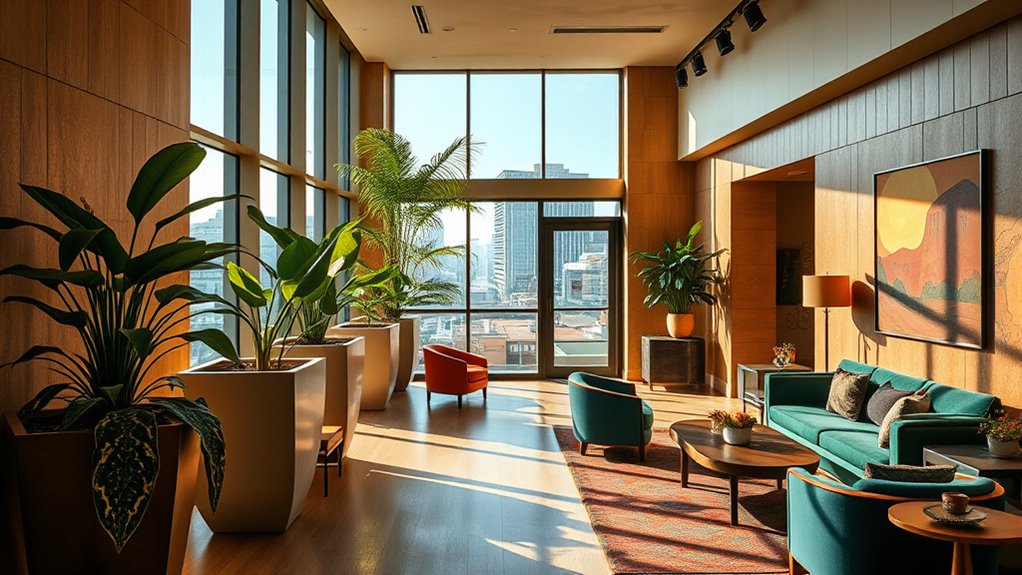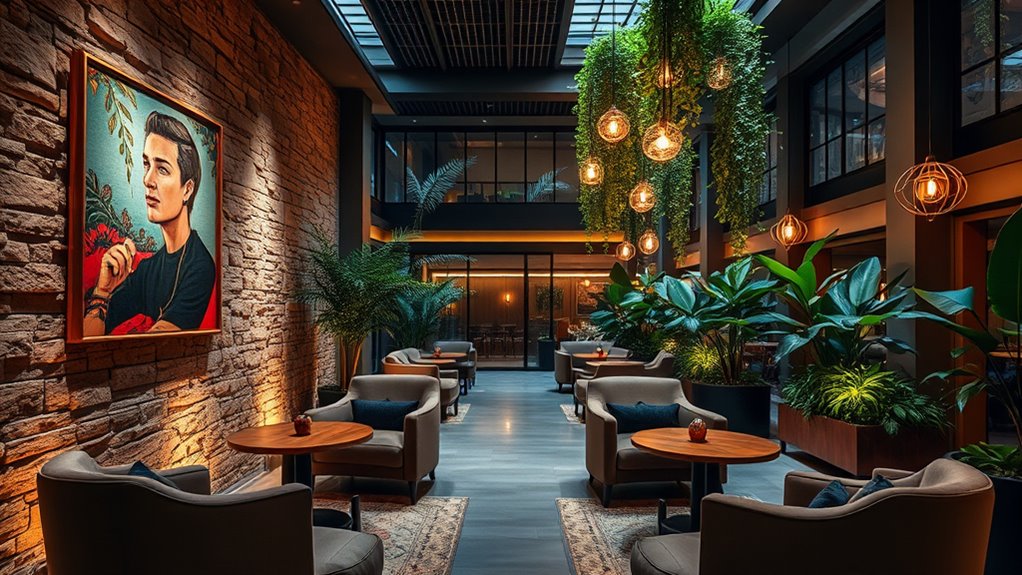In 2025, boutique hotels stand out by offering you highly personalized experiences, blending local culture with unique design and craftsmanship. They focus on creating intimate, warm atmospheres where staff anticipate your needs and foster genuine connections. Sustainability is key, too, with eco-friendly practices woven into every detail. These hotels balance innovation with authenticity, ensuring your stay feels both meaningful and memorable. Keep exploring to discover how these distinctive spaces redefine your travel experiences.
Key Takeaways
- Enhanced personalization and guest experiences foster emotional connections and memorable stays in small, intimate settings.
- Unique, culturally immersive design blending historic and modern elements creates distinctive atmospheres.
- Sustainable practices and eco-friendly materials align luxury with environmental responsibility.
- Technological innovations like AI-driven services and smart controls improve operational efficiency and guest convenience.
- Integration of local culture and wellness options offers authentic, holistic experiences that stand out in a competitive market.

In 2025, boutique hotels continue to redefine the guest experience by offering intimate, personalized stays that reflect local culture and craftsmanship. You’ll find these hotels typically have fewer than 100 rooms, creating a small, homey atmosphere that makes you feel like a valued guest rather than just another visitor. This focus on intimacy allows staff to deliver hyper-customized service, anticipating your needs and preferences to make your stay truly special. Unlike large hotel chains, boutique hotels prioritize meaningful connections, often personalizing amenities and experiences to suit individual tastes.
Design and ambiance play a critical role in setting these hotels apart. You’ll notice that their architecture often preserves historic features or blends classic elements with modern touches, creating an elegant yet authentic environment. The decor reflects local culture through the use of regional art, materials, and craftsmanship, immersing you in the neighborhood’s character. Interiors emphasize timeless elegance, warmth, and a personal touch that enhances your comfort. These spaces are designed to encourage social interaction without sacrificing privacy, fostering a sense of community while maintaining exclusivity. Boutique hotels are nimble and expressive, using their small size to innovate constantly—whether through creative design, unique amenities, or immersive experiences. Additionally, many boutique hotels are incorporating hotel hours and operational flexibility to better cater to guest needs in 2025. Incorporating cookie management practices ensures a seamless digital experience for guests and visitors alike. Moreover, leveraging predictive analytics for small business enables these hotels to tailor their services more precisely and optimize operational efficiency.
Sustainability is increasingly important in 2025, so many boutique hotels incorporate eco-friendly practices into their operations. You might find hotels that support local artisans and use sustainable materials in their decor, strengthening community ties while reducing environmental impact. Eco-conscious initiatives are often integrated into their daily operations, from energy-efficient lighting to waste reduction programs, aligning luxury with responsibility. Many hotels also incorporate sustainable design principles, ensuring their aesthetic appeal does not compromise environmental integrity. Wellness is also a major trend; many hotels offer immersive spa treatments, fitness options, and mindfulness activities tailored to your needs. Advanced technology, including AI-driven personalization, helps enhance your stay without compromising the boutique feel. From smart room controls to personalized recommendations, these innovations aim to make you feel understood and cared for.
The design of boutique hotels balances nimbleness and expressiveness. They often restore historic architecture or combine contemporary accents, creating spaces that are both charming and functional. Every detail, from interior decor to communal areas, aims to evoke a welcoming, elegant, and authentic atmosphere. You’ll find that spaces are intentionally crafted to invite social interactions, whether through curated local tours, cultural events, or simply cozy lounges. This combination of authentic design, personalized service, and innovative amenities allows boutique hotels to stand out in a competitive market.
Frequently Asked Questions
How Do Boutique Hotels Maintain Exclusivity With Increasing Popularity?
You can maintain exclusivity by leveraging hyper-personalization and AI-driven strategies that anticipate your guests’ needs. Focus on creating immersive, sensory experiences and artisanal details that feel unique and crafted just for them. Foster a sense of community through online engagement and storytelling, making guests feel part of a special club. By offering exclusive spaces and tailoring experiences to microsegments, you guarantee your boutique hotel remains special despite growing popularity.
What Innovative Technology Is Being Integrated Into Boutique Hotel Experiences?
Ever imagined stepping into a hotel where everything adapts to your mood? Boutique hotels now integrate innovative tech like IoT-enabled lighting, voice-activated controls, and remote smartphone management. They use AI chatbots for personalized recommendations and AR for local exploration. VR tours preview spaces, while biometric wellness tech enhances comfort. Don’t you want a stay where cutting-edge technology creates a seamless, tailored experience that truly feels like home?
How Do Boutique Hotels Impact Local Communities and Economies?
You see, boutique hotels considerably impact local communities and economies. They create jobs, boost property values, and encourage local spending, which strengthens the economy. They also preserve cultural heritage through renovations and promote sustainable tourism. By engaging with local businesses and offering authentic experiences, boutique hotels foster community revitalization. This growth attracts more visitors, further supporting local economies and helping small towns thrive in a competitive market.
What Sustainable Practices Are Boutique Hotels Adopting for Eco-Friendliness?
You’re curious about how boutique hotels embrace eco-friendliness. They adopt sustainable practices like using organic, renewable materials for decor, installing green roofs, and choosing non-toxic paints. They implement water-saving fixtures, energy-efficient lighting, and renewable energy sources. Waste reduction is key, with recycling, composting, and biodegradable amenities. By sourcing locally, they minimize transport emissions. These efforts create a greener guest experience, often showcased through eco-certifications, giving you a more responsible and authentic stay.
How Do Boutique Hotels Personalize Guest Experiences in 2025?
Ever wondered how boutique hotels make your stay uniquely yours? In 2025, you benefit from AI-driven concierge services that streamline your bookings and requests. Smart room controls adapt to your preferences, and hyper-personalization guarantees tailored experiences. They craft customized wellness programs, incorporate local craftsmanship, and offer personalized amenities. This seamless blend of technology and human touch creates memorable, individualized stays that truly reflect your needs and desires, making each visit extraordinary.
Conclusion
As you step into a boutique hotel, you’re greeted by personalized charm, yet surrounded by the bustling world outside. In 2025, these intimate spaces offer a perfect escape from the chaos, blending unique character with modern luxury. You’ll find comfort in their individuality, even as they stand out against the uniformity of big chains. It’s this delicate balance—personal touch amid innovation—that makes boutique hotels truly special for your next adventure.









